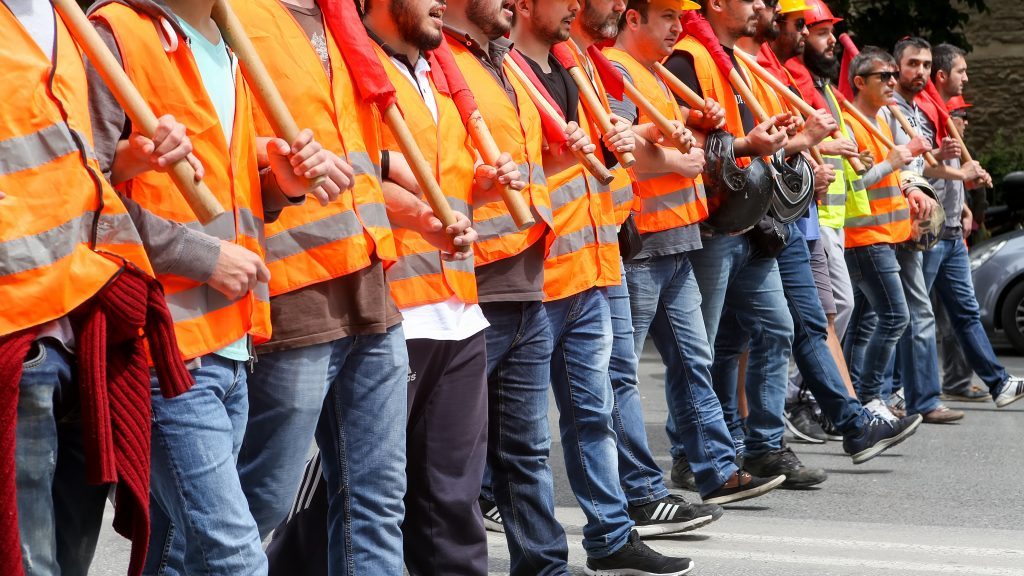First-year Canada’s Building Trades Unions director (CBTU) Arlene Dunn says it’s time for the unionized building trades across Canada to roll up their sleeves and develop new policies to build the sector at a critical time for the movement.
To that end she is convening the CBTU’s first-ever national policy workshop in Ottawa Nov. 5. Issues on the agenda include workforce development, training and apprenticeships; post-election government relations; capital and communications strategies; building the union movement; and collaboration with stakeholders to establish a clear pipeline between skills and jobs.
Dunn asked delegates attending the Provincial Building and Construction Trades Council of Ontario convention held in Niagara Falls recently to contribute to the dialogue.
“My job is to make sure make life is better for the 15 trades I represent,” said Dunn in her Oct. 17 address.
“As the new director our organization is turning a page. We are charting a new course.
“We need to promote the best of what we do, deliver on commitments, make changes when necessary, and we need to represent you nationally with one voice.”
Dunn took over from long-time CBTU boss Bob Blakely in March. The director said in her Niagara Falls speech and in an interview afterwards she realizes she is in a unique position as the first woman heading the CBTU — indeed, she is said to be the highest-ranking female not only in the unionized sector but in all of construction world-wide — at a time when the construction sector views the recruitment of women as a major imperative given the sector needs 260,000 new workers over the next decade.
Coming out of the policy workshop, Dunn aims to have a strategic plan to take effective next steps on that file.
“It has been the building trades who have been the leaders on this,” she said. “We have been the champions of equity plans, of diversity and inclusion provisions and respectful workplaces through collective bargaining.
“Now we need to make sure we execute this in the field and that we are building our market share.”
Dunn believes there is power in good data and said she can deliver the goods in that regard, with her success in the Newfoundland and Labrador skilled trades sector. There, through employment equity plans supporting the hiring of underrepresented groups on six major projects, the number of women working in the skilled trades rose to 13 per cent from the single digits.
One of my priorities is and will continue to be educating members of underrepresented groups and especially women,
— Arlene Dunn
Canada’s Building Trades Unions
“We have the historical data to back up the fact that if you don’t have solid employment equity plans with targeted ratios you will not move the yardstick on underrepresented groups to any significant degree,” she said.
“I can show the numbers when we have discussions with stakeholders, and anyone can go and validate them.”
Dunn said it is incumbent on the CBTU to make sure stakeholders such as governments understand the value the organization brings to the table.
“It is not just the skilled trades because the skill trades offer a wonderful opportunity, but the unionized aspect as well, that is something we need to focus on because that is the way to build a future into the middle class,” she said.
Research shows support for unions is up in Canada but union membership is down. Dunn said. Canada’s workforce now stands at about 26.5 per cent unionization — better than the 10 per cent of the U.S. but lower than Sweden’s 67 per cent, she said.
The women they want to recruit have to be told that unions are a good path out of poverty and into jobs with dignity and good benefits.
“One of my priorities is and will continue to be educating members of underrepresented groups and especially women about the unparalleled benefits and retirement pensions that the unionized trades offer,” said Dunn.
As the CBTU prepares to deal with the new government, it will stress the strength it has through its 500,000 members, said Dunn.
Goals will include good, unionized jobs, promoting apprenticeships, capacity building, promoting community benefits agreements, fair wages, better safety regulations, creation of a national asbestos agency and mesothelioma registry, and fighting for strong policies on green infrastructure, to combat climate change and force fairer transit policies, Dunn said.
The CBTU will also continue to work to help develop an effective solution to the opioid crisis, she said. Twenty-five per cent of opioid deaths come from the construction workforce, and the addictions are tied to suicides.
The CBTU has worked with the federal government to develop education materials for jobsites and training centres on opioids but more has to be done, Dunn argues.
“We need to educate our members better,” she said.
Follow Don Wall on Twitter @DonWall_DCN.











Recent Comments
comments for this post are closed